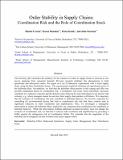| dc.contributor.author | Croson, Rachel | |
| dc.contributor.author | Donohue, Karen | |
| dc.contributor.author | Katok, Elena | |
| dc.contributor.author | Sterman, John | |
| dc.date.accessioned | 2014-06-30T16:51:03Z | |
| dc.date.available | 2014-06-30T16:51:03Z | |
| dc.date.issued | 2013-09 | |
| dc.date.submitted | 2012-05 | |
| dc.identifier.issn | 10591478 | |
| dc.identifier.issn | 1937-5956 | |
| dc.identifier.uri | http://hdl.handle.net/1721.1/88134 | |
| dc.description.abstract | The bullwhip effect describes the tendency for the variance of orders in supply chains to increase as one moves upstream from consumer demand. We report on a set of laboratory experiments with a serial supply chain that tests behavioral causes of this phenomenon, in particular the possible influence of coordination risk. Coordination risk exists when individuals' decisions contribute to a collective outcome and the decision rules followed by each individual are not known with certainty, for example, where managers cannot be sure how their supply chain partners will behave. We conjecture that the existence of coordination risk may contribute to bullwhip behavior. We test this conjecture by controlling for environmental factors that lead to coordination risk and find these controls lead to a significant reduction in order oscillations and amplification. Next, we investigate a managerial intervention to reduce the bullwhip effect, inspired by our conjecture that coordination risk contributes to bullwhip behavior. Although the intervention, holding additional on-hand inventory, does not change the existence of coordination risk, it reduces order oscillation and amplification by providing a buffer against the endogenous risk of coordination failure. We conclude that the magnitude of the bullwhip can be mitigated, but that its behavioral causes appear robust. | en_US |
| dc.description.sponsorship | National Science Foundation (U.S.) (Grant SES-0214337) | en_US |
| dc.description.sponsorship | Mary Jean and Frank P. Smeal College of Business Administration (Center for Supply Chain Research) | en_US |
| dc.description.sponsorship | Sloan School of Management (Project on Innovation in Markets and Organizations) | en_US |
| dc.language.iso | en_US | |
| dc.publisher | Wiley Blackwell | en_US |
| dc.relation.isversionof | http://dx.doi.org/10.1111/j.1937-5956.2012.01422.x | en_US |
| dc.rights | Creative Commons Attribution-Noncommercial-Share Alike | en_US |
| dc.rights.uri | http://creativecommons.org/licenses/by-nc-sa/4.0/ | en_US |
| dc.source | Other univ. web domain | en_US |
| dc.title | Order Stability in Supply Chains: Coordination Risk and the Role of Coordination Stock | en_US |
| dc.type | Article | en_US |
| dc.identifier.citation | Croson, Rachel, Karen Donohue, Elena Katok, and John Sterman. “Order Stability in Supply Chains: Coordination Risk and the Role of Coordination Stock.” Prod Oper Manag 23, no. 2 (February 2014): 176–196. | en_US |
| dc.contributor.department | Sloan School of Management | en_US |
| dc.contributor.mitauthor | Sterman, John | en_US |
| dc.relation.journal | Production and Operations Management | en_US |
| dc.eprint.version | Author's final manuscript | en_US |
| dc.type.uri | http://purl.org/eprint/type/JournalArticle | en_US |
| eprint.status | http://purl.org/eprint/status/PeerReviewed | en_US |
| dspace.orderedauthors | Croson, Rachel; Donohue, Karen; Katok, Elena; Sterman, John | en_US |
| dc.identifier.orcid | https://orcid.org/0000-0001-7476-6760 | |
| mit.license | OPEN_ACCESS_POLICY | en_US |
| mit.metadata.status | Complete | |
